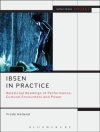This book explores how the English rural has been represented in contemporary theatre and performance. Exploring a range of plays, forms, and contexts of theatre production, Representing the Rural celebrates the lively engagement with rurality on English stages since 2000, constituting the first full study of theatrical representations of rural life. Interdisciplinary in its approach, this book draws on political philosophy and cultural geography in its definitions of rurality and Englishness, and works with key theoretical concepts such as nostalgia and ethnonationalism. Covering a range of perspectives from the country garden in Mike Bartlett’s Albion to agricultural labour in Nell Leyshon’s The Farm, the enclosure acts in D.C. Moore’s Common to Black rural history in Testament’s Black Men Walking, the book shows how theatre and performance can open up different ways of reading rural geographies, histories, and lives. While Representing the Rural is aimed at students and researchers of theatre and performance, its interdisciplinary scope means that it has wider appeal to other disciplines in the arts and humanities, including geography, politics, and history.
Table of Content
Introduction.- Chapter One: Staging the English Rural.- Chapter Two: Rural and Nation in Mike Bartlett’s
Albion.- Chapter Three: Simpler Times: Pre-Industrial Rural England in D.C. Moore’s
Common and E.V. Crowe’s
The Sewing Group.- Chapter Four: Muck, Cattle, and Pigs: Rural Labour in Nell Leyshon’s
The Farm, Richard Bean’s
Harvest, and Bea Roberts’
And Then Come the Nightjars.- Chapter Five: White Open Spaces: Race and Rurality.- Conclusion.
About the author
Dr Gemma Edwards is a Leverhulme Early Career Fellow at the University of Manchester, UK. Her work focuses on place, politics, and performance, particularly in non-metropolitan contexts. She has published on rurality in contemporary theatre, and her next project explores race, class, and English nationhood from 1945 to the present.












